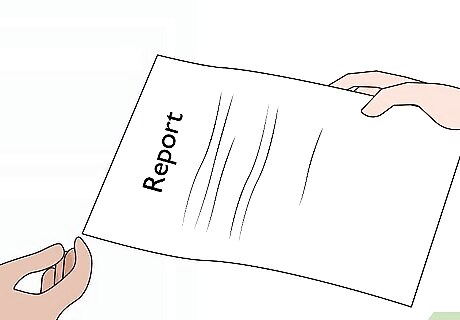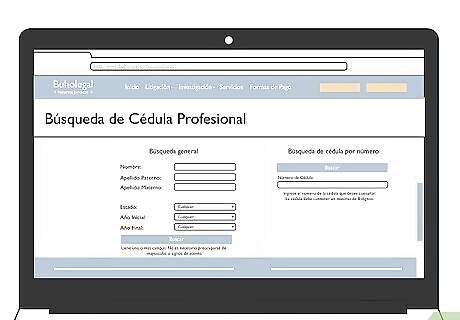
views
Triggering an Investigation

Locate the nearest state or local judicial police office. Federal officers are primarily concerned with organized crime and corruption. Everyday criminal matters, on the other hand, are handled by state or local police. If the crime has just occurred, go to the closest office you can find. If the crime took place in a hotel, restaurant, or other establishment, the owner or manager of the establishment may be able to tell you where to go to file your report. Typically, you won't be able to simply call the police and have them come to you. You'll have to travel to the police office in person if you want to file a report.

Provide factual information about the incident. When you enter the police office, tell the officers you see that you want to file a police report. If you're not planning on pursuing criminal charges, state that you want to file an "averiguación previa" or "reporte de hechos." Tell the officer as much specific factual detail as you know. Don't make assumptions or tell them what you think happened — tell them only what you know. If you have any evidence of the crime, show it to them. For example, if your hotel room was robbed, you might show them pictures you took of the broken window or your belongings scattered inside the room. If you were robbed, tell them exactly what was stolen.

Ask for a written report from the officer. Under Mexican law, you are entitled to a copy of your report free of charge. However, the officer might not give you one unless you ask for it. Make sure the report you receive has been signed by the officer and includes all of the information you provided. The officer may also ask you to sign the report. If you sign the report, get a copy of the report with your signature on it. If your ID or passport was stolen, the written report is the only thing that will allow you to get those replaced.Warning: Do not sign a report unless you have read and understood it and believe it accurately reflects the incident you described to the police. It is a crime to sign a false police report in Mexico.

Follow up on your report if you get any additional information. It is possible that you will uncover new information about the crime that you didn't notice in the immediate aftermath. Contact the police where you filed your initial report and let them know that you have more information. If you believe the information you have could lead to the suspect being identified, you may want to upgrade your report to a "denuncia" and pursue criminal charges. Insist that the new information you provide is written up and get a copy of the report. You may need this report for other authorities or to file an insurance claim. For example, if you were robbed, you'll need a list of everything that was stolen from you for your insurance claim. If you later discover other items missing, you'll want to add those things to the police report.
Pursuing Criminal Charges

Determine if the suspect is in custody. If the police have already arrested the suspect, a criminal trial is more likely. If the suspect was arrested at the scene of the crime, contact the police to find out where the suspect has been taken. If the suspect is not in custody, you can still attempt to pursue criminal charges. However, understand that it's not likely the suspect will be arrested unless you have significant evidence of the crime, such as photos or videos.

Go to the police in the district where the crime took place. Criminal proceedings in Mexico are generally rather slow. However, things will move more quickly if you file your report in the same district where the crime took place. Otherwise, you'll potentially have to deal with multiple districts and may have to file multiple reports. Local officers can help you find the best office to use. If you're a foreign national, contact your country's nearest embassy or consulate for assistance.Tip: Victims of crime in Mexico are often represented by attorneys. It's a good idea to hire a Mexican attorney to represent you, especially if you don't speak Spanish very well.

Give an officer a factual account of the incident. An officer will sit down with you to take your statement. Tell them all the facts that you know about the incident. They will likely also ask you questions about the incident, what you saw, and anyone else who was present. The officer might ask you questions that seem accusatory or make you feel as though you are being accused of wrongdoing. Try not to take it personally. Just tell them what you know and what happened as clearly as possible. If you don't speak Spanish very well, it's a good idea to go with someone who does. There may not be a police officer available who speaks your native language. If you're visiting from another country, talk to the people where you're staying. Hotel employees are more likely to speak other languages and might be willing to help translate for you.

Read over and sign your denuncia. Even though the police officer will write up the denuncia for you, it is considered a sworn statement. Read it carefully and make sure that you understand everything in it and that it's an accurate account of what you told the officer. If you aren't proficient in Spanish, you may want to get someone who is to read over the report and translate for you. If the suspect goes to trial for the crime, your denuncia will be used as your testimony against the person. While you may be asked to give additional statements, your denuncia will be your primary statement. For this reason, it's important to make sure everything in it is accurate. If you have any evidence of the crime, such as photos or videos, be prepared to hand these over to the officer. In some situations, this may mean that you have to hand over your smartphone or other device to be kept for evidentiary purposes.Tip: After you sign your denuncia, ask the officer if you can have a copy of it for your records.

Identify and confront the suspect. Within the next 24 to 48 hours, you may be asked to participate in a "careo." During this proceeding, you identify the person who committed the crime. A judge will be present, as well as the suspect's attorney. You also have the right to have an attorney present. During this proceeding, which will be conducted entirely in Spanish, you (or your attorney) can ask the suspect questions. The suspect may also question you directly.

Work with a Mexican attorney to complete the trial process. The trial process in Mexico is slow and lengthy, involving many hearings and the preparation of written testimony. Even though a ministerio público will prosecute the criminal charges, they do not represent you as the victim. Generally, it's best to hire a Mexican attorney to represent your interests and keep you advised of developments in the proceedings. Hiring a Mexican attorney is especially important if you don't speak Spanish very well, or if you're only planning on being in Mexico for a brief period of time. Without an attorney, the charges may be dropped after you leave the country.
Hiring a Mexican Attorney

Look for an "abogado" or "licenciado en derecho." The terms "abogado" and "licenciado en derecho" are used to refer to licensed attorneys in Mexico. These are individuals who have a law degree and are licensed to practice law at the state or federal level (or both). Groups practicing law together in a law firm may refer to their practice as a "bufete" or a "despacho." If you aren't proficient in Spanish, look for an attorney who also speaks your language, or who has translation services available.Tip: The title "licenciado" simply refers to a professional person, not necessarily one licensed to practice law. Make sure the title is followed by the phrase "en derecho."

Consult your embassy or consulate if you are a foreign national. If you are visiting Mexico from another country, visit the nearest embassy or consulate of your home country. The consular officers there can help you with your police report as well as help you hire a Mexican attorney. Attorneys known to the embassy or consulate also likely have experience representing people from your country. For example, the US embassy in Mexico City has a list of attorneys who speak English and Spanish available at https://mx.usembassy.gov/legal-assistance/.

Verify the attorney's license and credentials. A licenciado en derecho or abogado will have a law license known as a Cedula. This license means that they have completed all of their legal training and required community service and can legally practice law. There are both state and federal Cedulas. Attorneys you talk to might have either of these or both. If the attorney has a federal Cedula, you can look up their license at http://www.buholegal.com/consultasep/. Many state licensing boards have online search engines as well. Unlike in many other countries, attorneys are not required to complete continuing education to maintain their law license. However, many of the best attorneys do. If the attorney is a member of a Colegio (private associations similar to a bar association) or has a specialty certification, they likely participate in continuing education.

Ask the attorney questions about their practice areas and expertise. Because Mexico does not have a government bar association that evaluates the competency of attorneys, it's up to you to determine if the attorney you hire is professional and will represent you will. Ask them how long they've been practicing, what kinds of cases they take, and hothouse cases have turned out. If you are looking for an attorney to represent your interests because you are a victim of a crime, find out how often they've represented victims during criminal proceedings. You also want to know how many of those defendants have been prosecuted. Even though your attorney will not actually be prosecuting the crime, a large percentage of convictions shows that they represent victims well.

Put the details of the representation in writing. Once you decide to hire an attorney in Mexico, get a contract that states exactly what you'll pay the attorney to represent you and what they'll do on your behalf. Include information about how the attorney will keep you informed of things happening in your case. This is especially important if you're a foreign national who will be leaving the country after a short period. Once you leave, your attorney will be solely responsible for handling your case. You want to make sure that you're regularly informed of progress as well as the outcome of the trial. Keep in mind that trials in Mexico can take a long time and typically involve many hearings. If the defendant faces a sentence of more than 2 years, the judge legally has up to a year to reach their verdict.




















Comments
0 comment